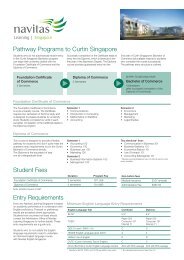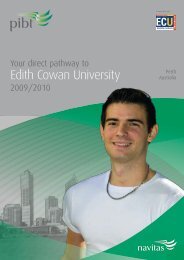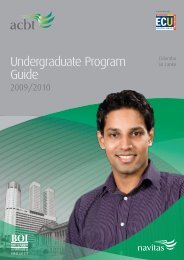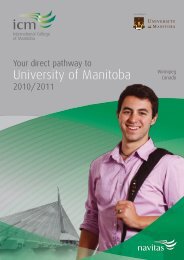Postgraduate Program Guide - Navitas
Postgraduate Program Guide - Navitas
Postgraduate Program Guide - Navitas
You also want an ePaper? Increase the reach of your titles
YUMPU automatically turns print PDFs into web optimized ePapers that Google loves.
Unit descriptions<br />
MBA5710 Managing Globally and Locally<br />
Prerequisites: Nil<br />
Description: This unit is an introduction to<br />
managing in organisations and integrates the<br />
diversity of elements that are the concerns<br />
of managers operating in global as well as<br />
domestic business environments. It will be<br />
achieved through a critical discussion of<br />
the roles of managers and characteristics of<br />
managerial work; the environment, structure<br />
and culture of organisations. The course<br />
includes the of the analysis of the evolution of<br />
management as well as the analysis of current<br />
managerial practice: ways of understanding<br />
managing, approaches to learning about<br />
managing; the nature of managerial work such<br />
as planning, organising, leading and controlling.<br />
The course will also critically examine the<br />
management of the organisation’s internal and<br />
external environments, the structural control<br />
of organisations. This unit will also examine the<br />
manager as a person, their roles and activities.<br />
Assessment: Coursework and final examination<br />
MBA5711 Leadership & Change Management<br />
Prerequisites: Nil<br />
Description: The capability to lead change is<br />
critical for ambitious organisational managers<br />
working in complex 21st century organisations.<br />
This unit aims to take the theories and<br />
approaches to leading and managing change<br />
off the page of texts and into the workplace<br />
practice. This unit examines both the strategies<br />
and the practices of leading change to generate<br />
a critical understanding of effective change<br />
leadership and process management in diverse<br />
contexts. It aims to build practitioner capability<br />
through the experience of exploring multiple<br />
case studies of change agent methodologies<br />
and practices. The class interaction will help<br />
the student build a taxonomy of different<br />
change approaches and practices, through<br />
analysing organisational case studies, and<br />
determining best fit change options for<br />
specific contexts. Participants will review the<br />
capabilities underpinning successful change<br />
leadership and make a personal self-assessment<br />
and development plan. Participants will use<br />
frameworks developed in class to investigate the<br />
leadership of change within a workplace with<br />
which they are familiar as a progressive action<br />
research assignment to apply their learning.<br />
Assessment: Coursework and final examination<br />
MBA5712 Managing People for Performance<br />
Prerequisites: Nil<br />
Description: This unit examines the<br />
management of people as key organisational<br />
assets in achieving high performance<br />
organisations and competitive advantage.<br />
Managing people from both a strategic and<br />
operational perspective is covered showing that<br />
Human Resource Management (HRM) is for both<br />
specialists and line managers. The link between<br />
HRM, strategy and performance is explored<br />
along with developing high commitment people<br />
strategies and the impact which this can have on<br />
organisational performance. Key research and<br />
case study material is covered. The contribution<br />
of HRM functions and activities such as<br />
resourcing and staffing, HRM planning, training<br />
and development, performance and reward<br />
management and compensation and effective<br />
people management is covered.<br />
Assessment: Coursework and final examination<br />
MBA5713 Business Strategy<br />
Prerequisites: MBA5710, MBA5715 & MBA5705<br />
Description: The unit introduces, outlines<br />
and explores the major themes, models,<br />
principles and practices of strategic<br />
management. This will include and emphasise<br />
the contrast between conventional intended<br />
strategy and the new concept of emergent<br />
strategy. The unit commences with a review<br />
of a strategic management model and three<br />
ways or “lenses” of examining strategic<br />
management in organizations and then<br />
moves to the description and discussion<br />
of each major element in the strategic<br />
management model. It also covers the strategy<br />
development processes and the emergent<br />
theory embedded in chaos/complexity.<br />
Assessment: Coursework and final examination<br />
MBA5718 Business Economics<br />
Prerequisites: Nil<br />
Description: The aim of the unit is for students<br />
to develop a grasp of economic theory and its<br />
applications to business management. This unit<br />
enables students to master selected aspects<br />
of economic theory and their application to<br />
business management. The unit follows a<br />
‘constructivist’ approach to student learning<br />
through a student-centred program of study.<br />
Students select a real world enterprise or<br />
organisation that they study in depth. Each<br />
student will construct a scenario for the business<br />
they have selected and develop a 4-year<br />
competitive strategy using the tools of economic<br />
analysis acquired in unit studies.<br />
Assessment: Coursework and final examination<br />
MBA5716 Finance for Business Decisions<br />
Prerequisites: Nil<br />
Description: Financial decisions are made to<br />
create value. This unit is designed to develop<br />
an understanding of how value creation is<br />
critical to a firm. It examines the critical role<br />
the finance manager plays in providing support<br />
to the various areas within the organisation<br />
in determining the use of limited resources to<br />
obtain optimal reward. The unit will introduce you<br />
to the basic analytical skills required to evaluate<br />
assets and investments and make corporate<br />
financial decisions. The functions of the capital<br />
market and financial institutions, and the tools<br />
used in the valuation of securities traded within<br />
the markets will be examined. The unit will<br />
introduce you to capital budgeting techniques<br />
and risk analysis through the use of appropriate<br />
case studies. It will also look briefly at some<br />
contemporary issues facing the finance manager<br />
like corporate governance and ethical dilemmas.<br />
Assessment: Coursework and final examination<br />
MBA5715 Accounting for Management<br />
Decision Making<br />
Prerequisites: Nil<br />
Description: This unit addresses the fundamental<br />
principles of financial and management<br />
accounting, financial statement, analysis, and<br />
the use of management accounting in planning,<br />
control and decision making. The unit has a ‘user’<br />
focus. It is not concerned with the preparation<br />
of accounts (i.e. debits and credits, and journal<br />
entries), but rather the interpretation of financial<br />
information. Performance measurement and<br />
financial statement analysis are employed to<br />
facilitate ethical internal decision making. The<br />
unit adopts a case study approach to highlight<br />
the effective use of financial resources a a key<br />
element in successful management and explores<br />
some of the tools that are available through the<br />
financial system of a business organisation.<br />
Assessment: Coursework and final examination<br />
7











